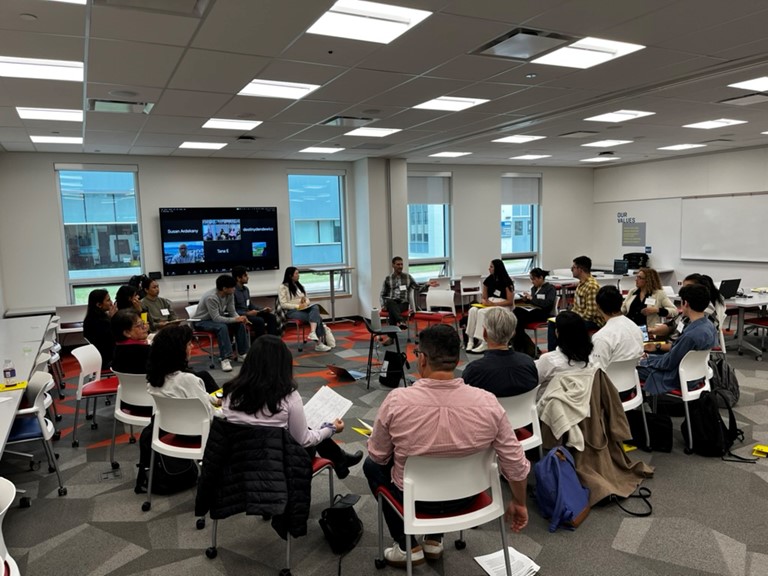BCIT Computing faculty Dr. Borna Noureddin originally came to a career in technology focused on how to apply it to overcome human challenges, specializing in human-computer interaction (HCI). With a PhD in biomedical engineering he worked on assistive technology for people with mobility limitations: tracking eye movements, building a brain-computer interface, and using smartphone sensors to tailor wheelchair design.
More recently, his attention has turned to looking at tech from another angle, as its own concerning impacts have emerged in areas like youth mental health, increased polarization, and even addiction.
From assistant to obstacle?
“We’ve seen technology grow in all facets of our lives, but this phenomenal growth has not always been driven by what’s best for us,” he explains.
Borna argues that there are a range of metrics where today’s design of technology might be failing, from environmental impact to happiness. And on the user side, uptake of technology has frequently been driven by what’s free and convenient over what is safe, healthy, and private.
“While technology was expected to ‘make life easier,’ in a lot of areas we’re instead seeing it only make specific tasks easier. The overarching goal of making life better, or even just saving us time, is not necessarily being achieved.”
As a technology educator, parent, and citizen Borna has grown concerned about the negative effects of social media and screen time on adolescents. “We’re seeing mental health becoming a much more significant issue for more young people, and it can be amplified by screen time, whether anxiety and depression impacts from social media or diagnosable technology addiction.”
Digital innovation for social transformation
His interest piqued, Borna drew on BCIT’s Institutional Research Fund for the first phase of his research, which resulted in new collaborators including Dr. Pouya Azar, Dr. Ziba Vaghri, and Deputy Ḵaa Shaadé Hení of the Carcross/Tagish First Nations Darla Jean Lindstrom. This collaboration led to a recent interdisciplinary stakeholder Symposium on Adolescent Mental Health and Addiction: Trends and Challenges.
The event brought together not only academics but also health care workers on the front lines, indigenous leaders, youth, and other community members, including some of those impacted. Borna was recently awarded a Natural Sciences and Engineering Research Council of Canada (NSERC) Discovery Horizons grant to build on his work and study how software design and development might be improved.
“One of the questions is how can real user choice – what we call agency – be built in at the design phase,” says Borna. “And beyond designing, how can our communities gain the digital literacy expertise needed to really understand the choices they are making.”
“How can real user choice be built in at the design phase?” – Borna Noureddin
Making values an intrinsic and explicit part of software design
Beyond basic things like is the code error-free or is the data secure, Borna believes that we need to be incorporating other values as we develop these important products.
“For example, the suggestion algorithm used in platforms like YouTube is based on what you watched – your past behaviour – not your underlying values. What if, instead, the embedded artificial intelligence (AI) algorithm was designed and developed to incorporate values in determining what suggestions to make?”
The first things that come to mind are basics like safety – keeping inappropriate content like violence and pornography away from children and youth. But Borna thinks there is room to move beyond these basics to incorporate other values, like health or even worldviews.
“When you start talking about values, we know values are very diverse and not easily quantified,” he admits. “So the work aims to explore that, how values can be articulated and then integrated into software design frameworks and methodologies.”
Where to next?

Borna will be working with students in the new Master of Science in Applied Computing, through research activities and by teaching a required course on Human-centered Computing. Students will investigate non-technical considerations in computer software design – social structures, ethics, environmental impacts, and how to avoid amplifying social inequalities.
“Information technology is a thriving sector with exciting new products and frontiers. And we rely on technology for vast critical systems as well as daily tasks and entertainment, and we will continue to do so,” asserts Borna.
“But technology should enhance our lives. Reimagined and developed the right way, I believe it can make the world better.”
Learn more about Borna’s work in the Digital Tools and Social Transformation Collaboration or get the latest from BCIT Computing through Tech It Out quarterly.

What a refreshing and welcome set of approaches and dimensions, to really enrich and humanize the modern search of values and technologies. Our research and development efforts, these days, lack the focal point of human development; a lack of attention to moral values that distinguish HUMAN progress.
I fully agree with the pervious comments and just want to add my admiration for Dr. Borna Noureddin for this great achievement. With this accomplishment the world inevitably will be in a greater state of being. I would like to express as well my admiration for his great team. More power to you for all your endeavors.